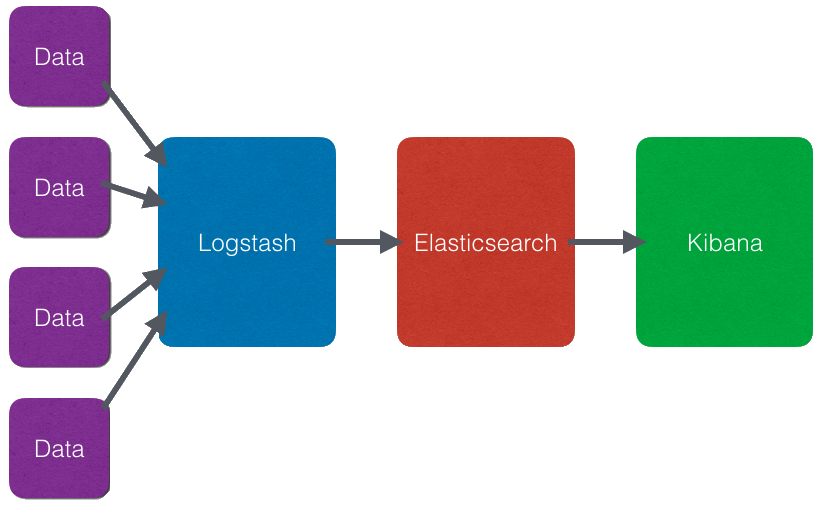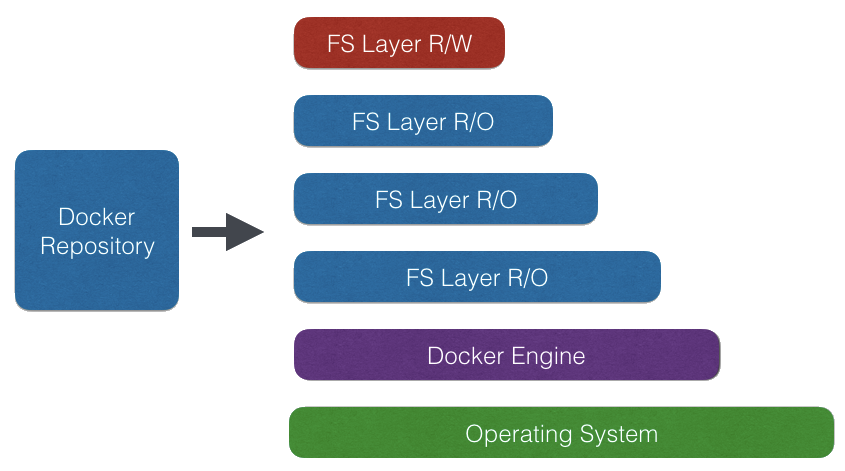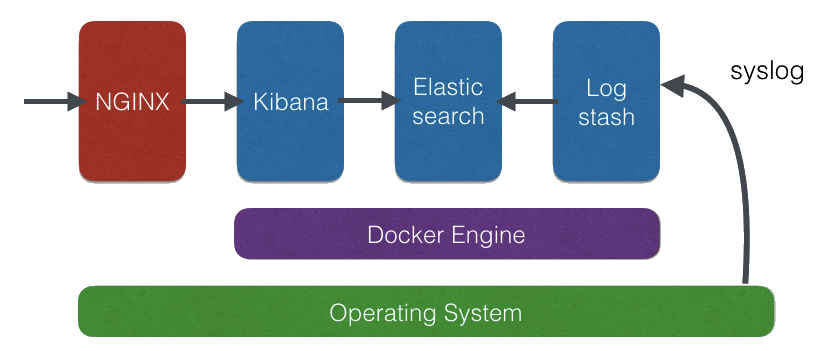Talk @ elasticserach usergroup vienna Log management with Logstash, Elasticsearch, and Kibana
- Elasticsearch - Search and analyze data
- Logstash - Collect, enrich, and transport data
- Kibana - Explore and visualise
Data is collected, enriched by Logstash and indexed within Elasicsearch. Kibana accesses the data stored within Elasticsearch and visualises it with a Single Page WebApp.
- High level API lightweight Linux containers
- Package format with all dependencies
- Layerd File System
It consiststs of the following building blocks
- Docker Engine - server process
- Docker CLI - command line interface to conrol the server
- Docker Repository - stores prepared docker images
Within the layerd filesystem all layers are read only except for the top layer. Layers can be stored within the repository and cached locally.
http://martinfowler.com/bliki/PhoenixServer.html
-
Install Java (as ELK is JVM based)
-
Download ELK binaries
-
configure
-
Set up services
But what about updates?
- Use official Docker packages
- configure
Updates are simple, just throw away server, run new version from repository
- Grab Ubuntu 16.04 box from https://cloud.digitalocean.com
- Install Firewall & Frontend NGINX Proxy
- Install Docker
- Install ELK on Docker from official repository
- Feed syslog to ELK
apt-get -y update
apt-get -y upgrade
ufw status
ufw default deny incoming
ufw default allow outgoing
ufw allow ssh
ufw allow 80/tcp
ufw --force enable
sysctl -w vm.max_map_count=262144
https://docs.docker.com/installation/ubuntulinux/
wget -qO- https://get.docker.com/ | sh
mkdir -p /var/docker/elasticsearch
mkdir -p /var/docker/logstash
chmod -R uga+rwX /var/docker
cat >/var/docker/logstash/syslog.conf <<'EOL'
input {
tcp {
port => 25826
type => syslog
}
udp {
port => 25826
type => syslog
}
}
filter {
if [type] == "syslog" {
grok {
match => { "message" => "<%{POSINT:syslog_pri}>%{SYSLOGTIMESTAMP:syslog_timestamp} %{SYSLOGHOST:syslog_hostname} %{DATA:syslog_program}(?:\[%{POSINT:syslog_pid}\])?: %{GREEDYDATA:syslog_message}" }
}
}
if "docker/" in [program] {
mutate {
add_field => {
"container_id" => "%{program}"
}
}
mutate {
gsub => [
"container_id", "docker/", ""
]
}
mutate {
update => [
"program", "docker"
]
}
}
}
output {
elasticsearch {
hosts => ["db"]
}
}
EOL
docker network create --driver bridge isolated-elk
docker run -d --restart=always -v /var/docker/elasticsearch:/usr/share/elasticsearch/data --net=isolated-elk -p 127.0.0.1:9200:9200 -p 127.0.0.1:9300:9300 --name elasticsearch docker.elastic.co/elasticsearch/elasticsearch:6.4.0
docker run -d --restart=always --link elasticsearch --net=isolated-elk -p 127.0.0.1:5601:5601 --name kibana docker.elastic.co/kibana/kibana:6.4.0
docker run -d --restart=always --link elasticsearch:db -v /var/docker/logstash:/usr/share/logstash/pipeline/ --net=isolated-elk -p 127.0.0.1:25826:25826 --name logstash docker.elastic.co/logstash/logstash:6.4.0
docker network inspect isolated-elk
docker ps
apt-get -y install nginx
apt-get -y install apache2-utils
htpasswd -c /etc/nginx/.htpasswd ops
cat >/etc/nginx/sites-available/default <<'EOL'
server {
listen 80 default_server;
listen [::]:80 default_server ipv6only=on;
root /usr/share/nginx/html;
index index.html index.htm;
server_name docker-elk;
location / {
try_files $uri $uri/ =404;
}
location ~* /.* {
auth_basic "Restricted";
auth_basic_user_file /etc/nginx/.htpasswd;
rewrite ^/(.*) /$1 break;
proxy_pass http://127.0.0.1:5601;
proxy_set_header Host $host;
proxy_set_header X-Forwarded-For $proxy_add_x_forwarded_for;
}
}
EOL
service nginx restart
sudo cat >/etc/rsyslog.d/10-logstash.conf <<'EOL'
*.* @@127.0.0.1:25826
EOL
service rsyslog restart
logger -s -p 1 "This is fake error..."
logger -s -p 1 "This is another fake error..."
logger -s -p 1 "This is one more fake error..."
docker run --log-driver syslog ubuntu echo "Test"


